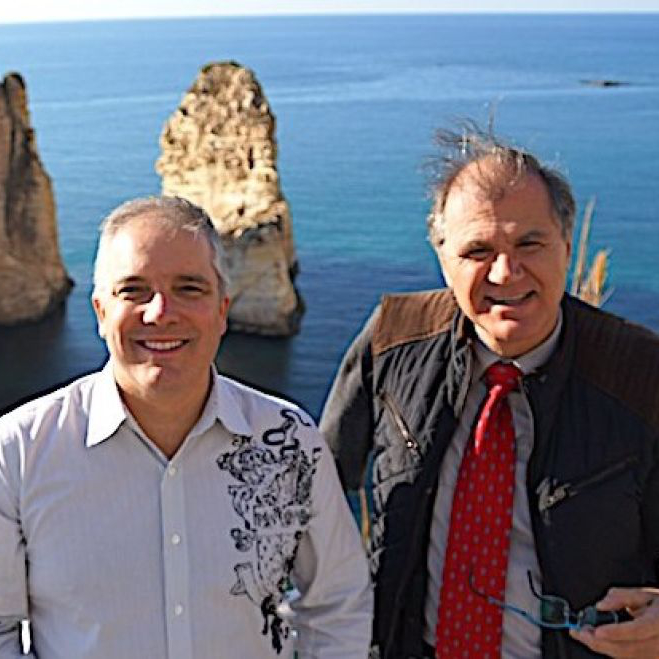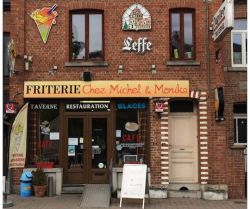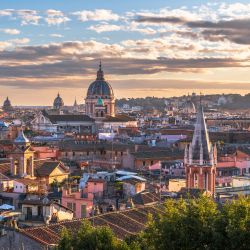Lebanese Chronicle I. "Go two by two!
Beirut, Saturday 3 December
From 3 to 9 December I'm in Lebanon with Olivier Fleury for the "JC 2033" project to visit several church leaders and social projects. Arriving late in the evening in Beirut (or rather early in the morning), we went to the "Life Center" in Bourj Hammoud, where we were staying. The next day begins with a meditation on the Gospel passage in which Jesus sends his disciples out on mission, two by two, to proclaim the Kingdom of God.
After a moment's silence, I have the impression that today's text is addressed to us personally, as two or three of us go to visit several people. It's a thought that lives in me and nourishes my prayer: the Kingdom of God is already among us. It's the presence of Christ; when he's here everything changes, hearts open. They are filled with joy and peace. We pray to the Holy Spirit to enable us to live this day and all the days to come in such a way as to preserve this precious presence of the Risen Lord in our midst.
Daniel Obeid, president of the Lebanese section of the World Student Christian Federation (WSCF), took us to Antelias, the headquarters of the Armenian Apostolic Church. He will be our guide and driver during our stay.
Get on with it!
Thanks to the contacts of Carla Khijoyan, who is in charge of relations with the Churches in the Middle East at the World Council of Churches in Geneva, and who has made several contacts on our behalf, we have the privilege of meeting Catholicos Aram I, Patriarch of the Armenian Apostolic Church of Cilicia.
"His Holiness" Aram (as he is called in ecclesiastical protocol, which always seems strange to Protestants) has a great deal of experience of the life of the Churches in the Middle East.
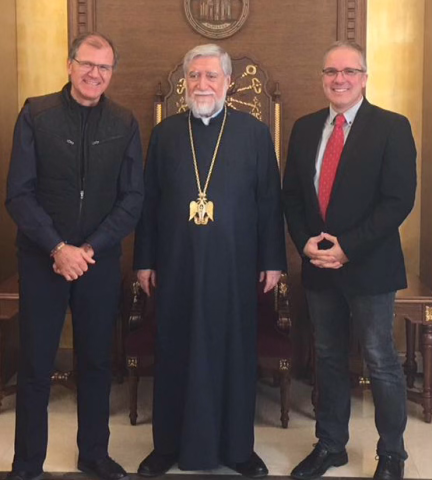 Catholicos Aram I with Olivier Fleury and yours truly
Catholicos Aram I with Olivier Fleury and yours truly
And in the wider world too, since he was President of the World Council of Churches for several years. Olivier briefly explains to him the purpose of our visit: how can the Churches give a common witness on the occasion of the 2000th anniversary of Christ's resurrection in 2033? With the problem of the two different dates for Easter in the Western and Eastern traditions. Aram replies with humour: "But is this really an insoluble problem? If God sent his Son into the world to solve problems, he will be able to solve this one. But theologians certainly need to discuss this question again.
As for the year 2033, he confided that it was the first time he had thought about it, and thanked us for that. He advises us to visit "two key patriarchs" of the Orthodox Church: Bartholomew of Constantinople and Kyril of Moscow, to discuss the matter.
As we were recently received by Pope Francis, he exclaims: "Ah, if the Catholic Church accepts the year 2033, that's a good basis. In fact, I met Pope Francis last week. For him, the question of unifying the date of Easter is very important, particularly for the witness of Christians in the Middle East in a Muslim context".
"Organising this jubilee of 2,000 years since the resurrection of Christ in the Middle East, where Christians have become a minority, will be very important. It will give them visibility". (Aram I)
How should this celebration be organised? Aram sees different levels: "First of all, this celebration must take place locally, because the Church is above all a reality of local faith, it is the people of God". Then there's the national level. In Europe, this level will be important. Thirdly, the regional level: "Organising this jubilee of 2,000 years since the resurrection of Christ in the Middle East, where Christians have become a minority, will be very important. It will give them visibility".
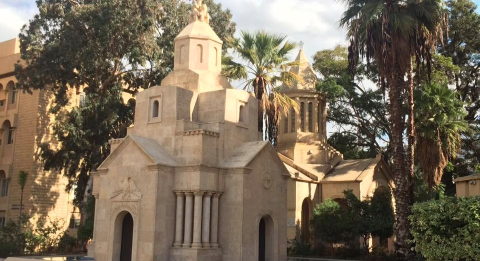 The 1915 Armenian Genocide Memorial
The 1915 Armenian Genocide Memorial
On an international level, where else could such a celebration take place? It's hard to say! All the churches would have to be involved. Perhaps the World Council of Churches could take the initiative and set up an international and inter-church coordination committee," says Aram. Aram concludes enthusiastically: "We're on the right track; we've started. It's a great project that needs to mature. Go ahead".
"Your dream is my dream too"
In the afternoon, we go to the Achafieh district, to St. Ephrem's Church, to visit Mgr Daniel Kourieh, Archbishop of Beirut of the Syriac Orthodox Church. He welcomes us in his audience room. Beside him is a portrait of the bishops of Aleppo, Yohanna Ibrahim and Boulos Yaziji, who were kidnapped in Aleppo in 2013.
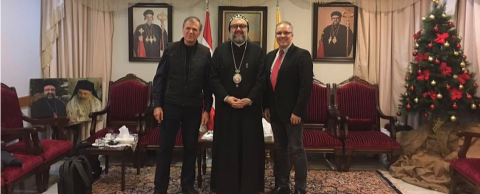
We have a dream," says Olivier, "that all Christians will celebrate together the two thousandth anniversary of the resurrection of Jesus in 2033! - Your dream is my dream too," replied Mgr Kourieh. It's the dream of every Christian, especially here in the Middle East! We who live with Muslims feel that it is very important to witness this together."
He adds that our divisions over the date of Easter are a contradiction in terms. In 2016, there was almost a 40-day difference between the two dates. Many Muslims called him to ask when they could come and greet him on this feast day. They didn't understand the reason for the two dates.
A few years ago, the patriarch of his church suggested to Pope John Paul II that the date of Easter should be the same. This is also the wish of the Coptic and Armenian Churches. The plan was to take a fixed Sunday in April, the second or third. "In Rome, they say they are ready, but resistance is coming from the Orthodox Churches of the Byzantine tradition".
"I thank you for this dream, I think it's a holy goal, an important sign of the unity of the Church. Go ahead, challenge the leaders. Turn your dream into reality! (Mgr Daniel Kourieh)
Daniel Kourieh believes that we should not wait until 2033 to rectify this state of affairs. For the Syriacs, there would be no problem in celebrating Easter together with other Christians. "If God doesn't bless us and give us His grace, we can't do anything. We have to start and God will continue the work. I thank you for this dream, I think it's a holy goal, an important sign of the unity of the Church. Go ahead, challenge the leaders. Turn your dream into reality!
Today we'll be taking part in a service at the Church of God "Life Center" and a mass at the Chaldean Church to meet Iraqi refugees.
Martin Hoegger
Lebanese Chronicle II. "Welcome one another"!
Beirut. Sunday 4 December.
I'm continuing my Lebanese chronicle for 'JC 2033'. Last night Elodie and Rémy Pilloud joined us for this week-long stay and we began the day with a brief lectio divina.
We take the text in which the apostle Paul calls on the Christians of Rome to welcome one another: "Welcome one another as Christ has welcomed you"! (Chap. 15) During this week, we will be welcomed in more than twenty different places. May we also be able to welcome, with an open heart, the people, Churches and communities, in all their great diversity, that we will discover!
At the end of our breakfast, we knocked on the door of our flat. It opened to reveal Pastor Said Deeb and his wife Cécile and...the Life Center church. Never in my life have I been so close to a place of worship on a Sunday morning! We attended the service of this Pentecostal church made up of Lebanese and Syrian refugees, some of whom are of Muslim origin. I was surprised to see children dressed up (see photo above). They explain that it's the feast of Saint Barbara, a young Egyptian Christian from the 3rd century who, after her conversion, disguised herself to escape the wrath of her pagan father, who wanted to kill her... which he eventually did.
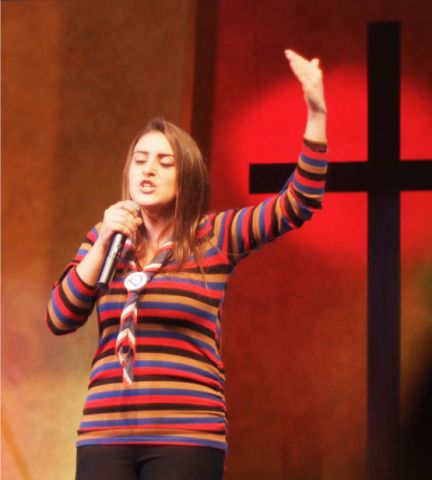 Reine, preacher for the day in the Life Centre
Reine, preacher for the day in the Life Centre
Olivier is able to present the JC 2033 project. The sermon on the theme of the call of Levi is given by Reine, Said's spiritual daughter, who has just finished her theological studies and is preaching for the first time. Like a feisty lioness, in fact! She really has the charisma of an evangelist.
With Iraqi refugees
At midday, we go to Saint Joseph's Maronite Church to take part in the mass of the Chaldean Church. This church, linked to Rome, is located in Iraq; its patriarch is Louis Raphaël Sako. The large congregation - over 400 people - is made up of Iraqi refugees. We go to greet the priest, a Salesian from Don Bosco. The congregation - men on the right and women on the left - was very vocal. The mass, led by a youth choir, was held in both Syriac and Arabic. To facilitate our participation, a deacon gave us a booklet in both languages...
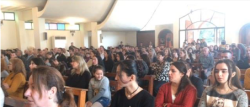 Iraqi refugees in the Chaldean church
Iraqi refugees in the Chaldean church
As we are in the season of Advent, the Gospel is that of the Annunciation to Mary At the end of Mass, I am invited to address the assembly. I introduce JC 2033 by starting again from the text on welcome on which we had meditated this morning: "Welcome one another" and speak of Mary who welcomed the Word. She is a model of life in Christ. In Him we can welcome one another, help one another, pray for one another, receive His peace in adversity. I was struck by the attention of the congregation.
At the end, we talk to some of the young people who tell us that they don't want to go back home. Several of them will be going to Australia.
The resurrection of Christ is the unity of Christians
Early in the evening we received a surprise visit from Daniel Obeid, our guide, and Zahi Azar, the director of the recently founded Middle East Ecumenical Institute. He wanted to meet us today even though a visit to his institute is scheduled for Wednesday. This organisation works in conjunction with the World Council of Churches and the Ecumenical Institute in Bossey, near Geneva. Its aim is the ecumenical training of young professionals, research and publications. It also reflects on Christian-Muslim dialogue. We hope that this will give new impetus to ecumenism," says Z. Azar. Azar, "because it has been weakened by the current situation: crisis, poverty, emigration, communities turning in on themselves".
The main problem for Christians in Lebanon is emigration. A majority a few decades ago, they now represent only 30% of the population. Half of young people want to leave. Similarly in Syria, two-thirds of Christians have left their country.
As our host is a member of the Orthodox Church, Olivier, after presenting the JC 2033 project, said to him: "We really need the Orthodox, because you understand the resurrection in depth, so help us! And Zahi Azar confirms that Orthodox theology is based on the resurrection. Only the risen Christ can bring us together in all our diversity. The world is waiting for this message.
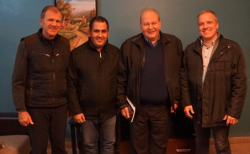 With Daniel Obeid and Zahi Azar
With Daniel Obeid and Zahi Azar
As far as the 2000th anniversary of Christ's resurrection is concerned, he sees it as a call to combat fragmentation: "Christians have forgotten that Christ's resurrection is their unity," says Azar. This event will restore the resurrection to the lives of the faithful. It must be at the heart of our lives, whereas globalisation has pushed it to the margins. Your project will help ecumenism to overcome its crisis. I also think that the resurrection will give new impetus to institutional ecumenism. All solidarity must be nourished by the resurrection".
Young people lead the way
Every year, Daniel Obeid, president of the Lebanese section of the WSCF (World Student Christian Federation) and other organisations organise a gathering of young people on the theme of "Celebrating Christ's resurrection together". The day begins with a rally. The young people learn to say "Christ is risen" in several languages. They discover the meaning of the resurrection in the different Churches. Then in the evening, a celebration brings them together, to which the leaders of the churches have been invited. Dance, flash mob and agape round off the day, with up to 400 young people taking part in Beirut. It's a unique event in Lebanon.
Martin Hoegger
Lebanese Chronicle III: "Get up and walk!
Beirut 5 December 2016
With Olivier, Elodie and Rémy, we've got into our stride. Our third day in Lebanon began with a time of meditation on the Gospel. We read the story of the healing of the paralytic brought through the roof of a house to the feet of Jesus by his four friends. After a time of silence, each person is invited to underline a word from the text that will nourish his or her prayer. It's "Get up" that strikes me. Rise" is also the word for resurrection. When the Risen Lord is with us, he encourages us to always get up and go out to the world he loves: "Get up and walk!
A dynamic centre
For our first visit, we didn't have to walk far, as we were met by Pastor Said Deeb, director of the Life Center where we were staying. This centre belongs to the Church of God (Pentecostal) and is also home to several migrant communities. There is also a school and a social centre, as well as a recently founded Bible institute.
We are impressed by the dynamism of this centre and its capacity to welcome people, which is not without its tensions: "We have helped 17 Christian migrant communities. They have been through this centre and are now in other premises. The current challenge is the Syrian refugees. Some members of our church have left because we also help Muslims. But we are moving forward.
"2033 may seem a long way off, but we are preparing for this event today. Each church has its own programme, but how can we do something together? We need to talk to all the churches about it. (Said Deeb)
Said Deeb tells us that the centre keeps him very busy, so much so that he has little time to meet the other evangelical communities. A conference brings them together once a year. He is also keen to take part in the Week of Prayer for Christian Unity in January, when he is invited to preach in the Catholic and Orthodox Churches. This year, the Life Centre welcomed over a thousand members from the various churches in the Bourj Hammoud district.
2033 seems a long way off," he says, "but we are preparing for this event today. Each church has its own programme, but how can we do something together? We need to talk to all the churches about this.
Understanding needs and taking action
We stay in this neighbourhood and go with Ani Boujikanian to the centre of the Armenian Evangelical Social Action. I've been in touch with Ani since last year, when she spoke at a conference on the Armenian genocide in Lausanne.
She welcomes us with two managers, Aline Deyirmenjian and Talin Mardirossian, who explain the many activities of this centre supported by Christian Action in the East: helping lonely elderly people, support for medical care, an after-school programme for children and groups for teenagers. "So many opportunities to show God's love to children. Everyone has immense potential," says Aline.
But since the arrival of the Syrian refugees, work has doubled in all these areas. Some of the children have experienced great trauma. This requires a lot of love and patience. "Having lived through the civil war in Lebanon ourselves, we understand their needs and how to act," says Ani.
Talin then took us for a walk through the very working-class district of Bourj Hammoud, to give us an idea of how precarious conditions are. On our return, she spoke to us about the meaning of resurrection for her: "If there is no resurrection, what is the point of believing and living? I was so happy to hear about your project. It's the resurrection that gives me strength. It's my compass, without it I'm lost and couldn't work here. It's not a concept, but a person: Jesus".
The people of the resurrection
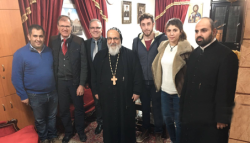
After sharing a meal with our new friends, we headed up into the hills to visit Mgr Georges Saliba, Metropolitan of the Syriac Orthodox Church of Mount Lebanon. He welcomed us in the company of the deputy secretary of the Middle East Council of Churches... with many sweets, tea and coffee served several times.
After Olivier Fleury presented the Jesus Celebration 2033 project to him, he said: "We are the people of the resurrection. The resurrection is the basis of our faith: if Christ has not risen, our faith is in vain. This is the first time I've met an association centred on the resurrection, and I'm very happy about it.
"We are the people of the resurrection. The resurrection is the basis of our faith: if Christ has not risen, our faith is in vain" (Mgr George Saliba).
Mgr Saliba points out that in Eastern Christianity, everything is centred on the resurrection. Unlike in the West, we don't talk so much about Easter as we do about the Feast of the Resurrection of Christ. Emphasising the resurrection draws people to faith.
The problems begin when some Church leaders compromise with the resurrection. "I wish to be with you in this beautiful project and I will speak to his holiness Patriarch Ephrem II about it. You must go to Damascus to meet him", he concludes before praying for us and giving us his blessing.
Resurrection in everyday life
Dany El Obeid takes us to Aïn Aar, the centre of the Focolare movement, in the hills above Beirut. We are welcomed by the ecumenical committee of this movement with broad horizons centred on the "Testament of Jesus", namely his prayer for unity before his passion: "That they may all be one"! (John 17:21)
"Our way of life is to live the Gospel and seek what unites us. If we start with the 'golden rule' that Jesus gave us - 'do unto others as you would have them do unto you' - we find that prejudices fall away", says Maria, the centre's manager.
This is how around a hundred Muslim families came to the centre for a month during the 2006 war. Bonds were forged, and yesterday they spent a day together to remember.
"We need to start preparing now for this event in our daily lives by living the resurrection".
Sharing Olivier's vision of 2033 elicited a great response: "For us, unity through Jesus crucified and risen is truly the synthesis of the Gospel," said one participant. "We need to start preparing for this event now in our daily lives by living the resurrection.
Another: "Persecuted Christians experience the resurrection on a daily basis. Without it, they would not survive. They bring life back to its essentials". This festive and joyous occasion ended with a sumptuous Lebanese buffet topped off with the sweets of "Sainte Barbe", in memory of the martyr celebrated yesterday.
Truly, through all these beautiful encounters today, Christ is also encouraging us to go forward: "Get up and walk"!
Martin Hoegger
Lebanese Chronicle IV: "Rediscover and rejoice
Beirut, 6 December 2016
"Find" is the word I underline in the parable of the lost sheep that Elodie, Rémy and Olivier and I are meditating on this morning (Matthew 18:12-14). Just as the shepherd finds his sheep and celebrates, each reunion is a joy. Today I met up with friends I've known in different places. If meeting up with a friend makes the heart grow fonder, what joy will God experience when he meets up with the person who returns to him?
Don't hide the joy of the resurrection
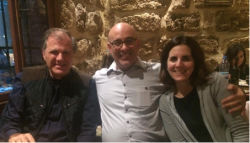 With Nadia and Martin Accad
With Nadia and Martin Accad
The first friend I see again is Martin Accad, professor at the Arab Baptist theological Seminary and director of the Middle East Institute of Studies. Martin is the son of Lucien Accad, former director of the Bible Society of Lebanon, with whom I had collaborated on several occasions when I myself was director of the Swiss Bible Society.
He specialises in Syriac literature and Islamology. He is committed to ensuring that the Churches take a different approach to Islam and discover its positive aspects, not just its violence.
"2033 will be an opportunity to celebrate hope in a despairing Middle Eastern context". (Martin Accad)
Christ is supra-religious," he says. His teaching on love of enemies is unique. It defies all institutional religion. The joy of the resurrection must not be hidden. It has a stronger message than the birth of Jesus. 2033 will be an opportunity to celebrate hope in a despairing Middle Eastern context".
Mr Accad believes that this event will be an opportunity to visit Muslim leaders. Lebanon could be a model for other countries. "Lebanon is a message", said Pope John Paul II.
The transforming presence of the Risen Christ
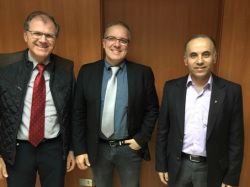 With Fr. Fadi Daou
With Fr. Fadi Daou
We went to Adyan's head office to meet Father Fadi Daou, director of this foundation which works to improve understanding between Muslims and Christians. I met Fadi during a trip to Lebanon by the Communauté des Eglises chrétiennes dans le Canton de Vaud in 2011, and then invited him to give a number of talks in French-speaking Switzerland.
He gets straight to the heart of the matter, asking us three questions about "Jesus Celebration 2033". What is your understanding of the resurrection? Celebrating it on such a scale requires us to go deeper into its meaning and to seek a common understanding among Christians.
How can we communicate faith in the resurrection through a major event without turning it into a product? Marketing is detrimental to the message we want to communicate and is not in keeping with being Christian.
"We are witnesses to God's presence in the world. The resurrection is to be seen in people who are transformed, and not only in Christians" (Fadi Daou)
How can we understand the presence of the Risen Christ today? He is there where people experience God's word and love," answers F. Daou. As a Catholic, I also refer to the Second Vatican Council, which says that everyone can participate in the Paschal dynamism if their heart is open. We are witnesses to God's presence in the world. The resurrection is to be seen in people who are transformed, and not just in Christians! For example, a Muslim working for peace today and sacrificing his life in Aleppo to help others is also animated by this Paschal dynamism".
Biblical ecumenism and the martyrs
Dany Obeid then took us to "Bible Society Street" at the Society's headquarters to visit Mike Bassous, its director, whom I had met recently in Switzerland. The Bible Society is "one of the key ecumenical players in the Middle East", he tells us. All the recognised Churches are members of the Society, and it serves them by publishing and distributing the Bible. This year, it distributed 250,000 copies of the New Testament. It organises a Bible week and youth meetings.
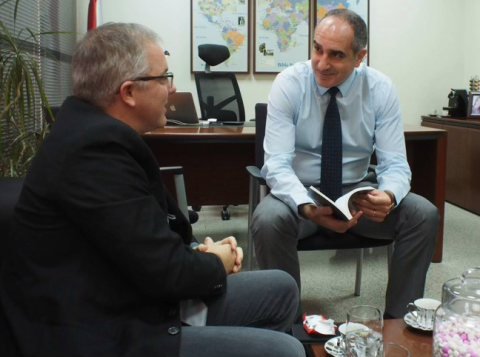 Bassous, Director of the Bible Society of Lebanon
Bassous, Director of the Bible Society of Lebanon
How can Bible Societies be at the service of Bible distribution in 2033? In the Middle East, a regional group will be able to think about this; it has just published a Bible entitled "Peace and Justice in the Middle East". Mr Bassous also advises us to make contact with the world centre of the Universal Bible Alliance and with some key societies in the regions. He also recommends that we communicate well with the churches by visiting their authorities.
As well as biblical ecumenism, Mike also talks about the ecumenism of the martyrs in this region: "With the persecutions, Christians are coming together. I see this as the beginning of a new mission. When 21 Copts from Egypt were martyred, we didn't see the members of an Eastern Church, but first and foremost Christians. Persecution leads to a deeper level of faith. I'm optimistic, because God is working through the blood of the martyrs".
Martin Hoegger
Lebanese Chronicle V. "The smallest in the Kingdom of God The smallest in the Kingdom of God
Beirut, 7 December 2016
On Tuesday evening Olivier and I were invited by the "Mission de Vie" community in the hills above Antelias. The meeting began with a mass attended by disabled people linked to the Lumière et Vie movement, founded by Jean Vanier. The Gospel text spoke of John the Baptist, the greatest of the prophets, but "the least in the Kingdom of God is greater than he".
Invited to speak, I asked myself who is "the least of these". My reflection is that the smallest, the poorest, the strangest, the sickest, the most persecuted was... Jesus crucified. But because he remained in love, death could not hold him. He rose from the dead and is waiting for us today in the least of these. Whatever we do to them, we do to Christ (Matthew 25:40).
Working together with our respective charisms
Mission de Vie, this new community founded by Father Wissam Maalouf, is inspired by the spirituality of Mother Teresa. Founded in the aftermath of the civil war, it now has around forty brothers and sisters. A unique example of a mixed monastic community in the Maronite Church.
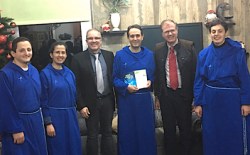
It takes in children and the elderly, helps prisoners reintegrate after their release, has set up facilities for the homeless and founded the first palliative care hospital. "At the beginning, we didn't want to found a congregation but to follow the Holy Spirit. For us, everything starts with friendship with Jesus", says Wissam.
The presentation of Jesus Celebration 2033 arouses his enthusiasm, as well as that of the brothers and sisters with whom we share the meal: "It's an idea of the Holy Spirit. We're looking forward to working together with our respective charisms. Providence will know how to create bridges so that we can meet again", exclaims Wissam.
At the start of our stay in Lebanon, Olivier and I also met Catherine Mourtada, founder of the Tahaddi Association, which works with the poorest of the poor in Beirut.
A school for over 350 children, a medical centre and aid for Syrian refugees are just some of its commitments. 2033 is really too far away," exclaims Catherine. I'm in the present, worried about the children who can no longer go to school because their parents prefer them to sell Kleenex so that they can earn a few pennies!
Demonstrating unity in love
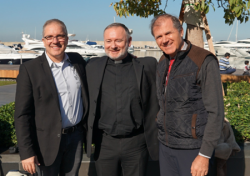
After the 'little ones', we go to a neighbourhood where the 'big ones' live. This morning, we're in Ras Beirut with David Roche, a priest of the Anglican Church. After giving us a tour of the modest church, tucked away between the skyscrapers, he took us down to the seafront for a coffee.
His community, he tells us, is transient. A lot of people come and go. A number of Lebanese who have married foreign women are involved. He has had good experience with the Alpha courses, an introduction to the Christian faith "for people who believe but don't know what they believe".
He was quick to share his impressions of JC 2033 with us: "As soon as I heard about this project, I said to myself: this is a magnificent opportunity to gather around Christ... He alone can bring us together. This is a great project: it shows unity in love. I think it is inspired by God".
We need hope
We then go to the NEST (Near Eastern school of theology), the Protestant theology faculty of the Middle East. Here we meet its president, Professor Georges Sabra, and his predecessor Mary Mikhael.
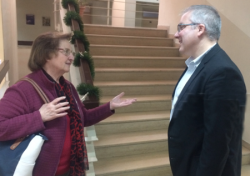
My first reaction," says G. Sabra, "is that it's a great idea, because the resurrection is at the heart of Christianity. But that's sixteen years away. Here in the Middle East, everything changes very quickly. I need to think about it. He wonders what the objective of this project is, and warns us against the risk of triumphalism.
Mr Mikhael shares his thoughts with us: Christianity was born here, but do Christians have a future? Especially young people. She recently visited her mother in a village in Syria, but all the young people had left. "We need hope. What can we do right now to embody the reality of the resurrection every day?
Re-emphasising the centrality of Easter
At another point in our stay in Beirut we meet Nabil Maamarbashi, from the National Evangelical Church, the one that founded NEST. His first reaction is to think that 2033 is a long way off, but it's good to think about it in advance, like the 500th anniversary of the Reformation. We started talking about it ten years ago, and we haven't seen the time go by.
"Our Church is open to collaboration. We are going to start praying for this event. I understand now that it's a path".
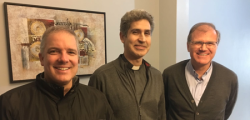
Nabil points out that this project will put the spotlight back on the festival of the resurrection. In the Gospels, the passion and resurrection of Jesus are central, not his birth. In the icons, the birth of Jesus is interpreted in terms of the cross and the resurrection: Jesus' clothes are reminiscent of a shroud. "My parents don't know the day they were born, but they do know when they were baptised. Spiritual birth is more important than physical birth".
Lebanese Chronicle VI. "Pray for the peace of Jerusalem!"
Beirut, 7 December 2016
Nearly 2000 years ago, Jesus died and rose again in Jerusalem. Today, however, it is not possible for a Lebanese Christian to go and pray there until the Israeli-Palestinian conflict has been resolved. The government forbids it on pain of imprisonment. On several occasions, however, we have heard how strong is the desire, one day, to be able to go on pilgrimage to the holy city. Especially in 2033! The words of the Psalm resonated strongly within us: "Ask for peace for Jerusalem: May those who love you, Jerusalem, enjoy peace! (122,6) ".
A project with a strong spiritual dimension
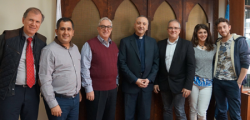 From left to right - Martin Hoegger, Dany El Obeid, Samer Lacham, Michel Jalakh, Olivier Fleury, Elodie and Rémy Pilloud
From left to right - Martin Hoegger, Dany El Obeid, Samer Lacham, Michel Jalakh, Olivier Fleury, Elodie and Rémy Pilloud
We arrived at the Middle East Council of Churches, where we were welcomed by Fr Michel Jalakh, its General Secretary, and Samer Laham, Regional Director of the Ecumenical Aid Service. Michel Jalakh, the Council's General Secretary, and Samer Laham, Regional Director of the Ecumenical Aid Service, took the opposite view of what we have often heard about the move away from the date of 2033: "It's a very original idea. We need to think it through. Sixteen years is nothing for the churches. It's very important to take time.
"A project like this could be a cornerstone for our region. It has a strong spiritual and Christocentric dimension, which is fundamental for us". (Michel Jalakh)
The role of the Council of Churches will be to publicise the "Jesus Celebration 2033The role of the Council of Churches will be to make the "Jesus Celebration" project known to the member churches, to involve them and to extend it to other churches. Mr Jalakh also stresses that this initiative should not replace other initiatives and those of the churches. It will add value: "A project like this could be a cornerstone for our region. It has a strong spiritual and Christocentric dimension, which is fundamental for us".
S. Laham notes that people are very concerned about the current situation: the search for peace, instability, how to stay in the Middle East, the rise of extremism that affects minorities. How can the churches come up with a common idea of witness? "This 2033 project is a seed that needs to grow. We need to start by sharing the idea. We must not forget the role of the Christian media and involve youth associations.
Training in the importance of the resurrection
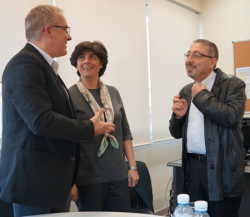 With Souraya Bechealany and Gabi Hashem, at the Middle East Ecumenical Institute
With Souraya Bechealany and Gabi Hashem, at the Middle East Ecumenical Institute
In the second part of the day we are on the 7th floor of Saint Joseph's University to meet Gabi Hashem, President of the recently founded Middle East Ecumenical Institute. He is accompanied by Souraya Bechealany, an ecclesiologist and teacher, and Zahi Zahar, director of the Institute, who visited us on Sunday evening.
G. Hashem is a leading figure in Lebanese ecumenism. A Melkite priest, he is, among other things, a member of the Faith and Order Commission, editor of the magazine Proche Orient Chrétien and member of the International Theological Commission. He is committed to creating an ecumenical institute similar to the one in Bossey, near Geneva: "In 2014, 45 young people from various Arab countries studied there. It's a sign of hope for them and for us too, because it brings them out of their isolation".
Our churches need resurrection. Educating young people about the importance of Christ's resurrection will be our contribution. (Gabi Hashem)
He recently took part in a meeting of the Global Christian Forum in Lebanon. It was a very good meeting with evangelicals and Pentecostals. At the presentation of the JC 2033 project, he exclaimed: "Magnificent. We don't have the luxury of choosing dialogue; it's imperative. We can choose formation. Without training, there can be no real dialogue. What characterises the faith of Eastern Christians is the cry in the night: Christ is risen! Our Churches need resurrection. Training young people in the importance of Christ's resurrection will be our contribution.
Onwards to 2033...
Souraya Bechealany hopes that this event can be celebrated by all Christians in Jerusalem: "A powerful symbol would be to be able to celebrate the resurrection in 2033 in Jerusalem, but for that to happen there has to be peace. Today, no Lebanese can go there. Let's pray that Jerusalem becomes an open city for everyone".
"Let us pray that Jerusalem becomes an open city for all! ". (Souraya Bechealany)
She is thinking in particular of young people. They need a big project. Why not include 2033 in the WSCF (World Student Christian Federation) programme," she says, glancing at Dany Obeid, the president of the Lebanese section, who is our guide during our visits. "In the hustle and bustle of the insignificant events that go by, young people need to experience and celebrate this event, the only one that doesn't go by: the resurrection of Jesus. En marche vers 2033 could be the name of this movement!
Martin Hoegger
Lebanese Chronicle VII. "Listen to him!
Beirut, 8 December 2016
In the Church, everything begins with listening! In the Old Testament, it is the first commandment: "Listen, Israel! The Lord is your God". On the Mount of Transfiguration, God said to us: "This is my beloved Son, listen to him! This is the last day of our meetings in Lebanon. We have had more than twenty during this rich week, during which we have tried to listen to the Word of God and its echo in the people we visited.
This morning, before setting off, we meet evangelical pastor Ronnie Bassous, who is in charge of Le Grain de Blé in Lebanon, an international association (based in Switzerland) that works with children. He hopes that this project will bring together the historic churches and the evangelicals (and the evangelicals among themselves). He invites us to include children in all our celebrations: "In their simplicity, they have no problem uniting. Your project is fantastic, how can I contribute to it?"
"The disaster of our world is disunity, your project will contribute to unity".
As I head north, Olivier Fleury, Elodie and Rémy Pilloud-Wittmann head up to the Bekaa plain, led by Dany Obeid, to meet Mgr Antonios Al Soury, Orthodox bishop of Zahle. "We met a bishop and left a friend behind. A trust was established. The Spirit of God was at work in each of us. I really liked what he had to say about the resurrection.
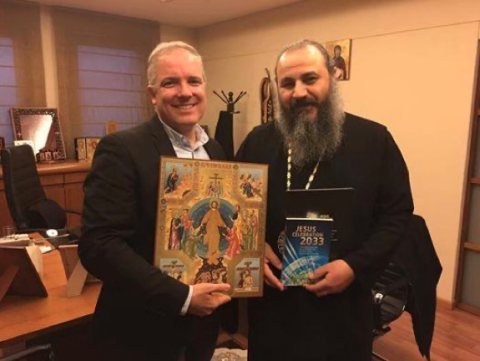 Olivier Fleury and Mgr Antonios Al Soury, Orthodox Bishop of Zahle
Olivier Fleury and Mgr Antonios Al Soury, Orthodox Bishop of Zahle
Mgr Antonios presented the resurrection as new life and the revelation of love against the old Adam. If people have experienced the resurrection, they can talk about it. To have this experience is first to die to oneself. "The disaster of our world is disunity; your project will contribute to unity", he says.
Joint testimony, a priority
As for me, I'm heading north. My friend Antoine Semaani, a Lebanese-Swiss currently studying at the Maronite seminary of the archdiocese of Tripoli, came to pick me up to go to Balamand University.
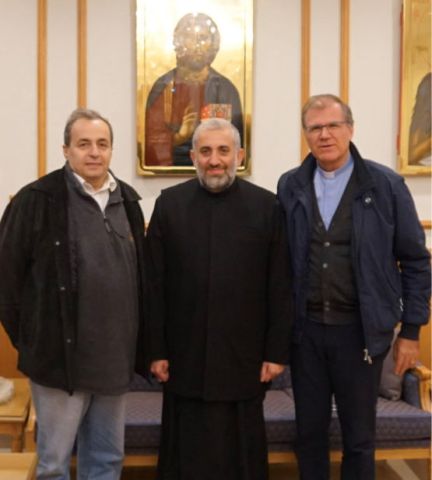 Antoine Semaani, P. Porphyrios Georgi and Martin Hoegger in Balamand
Antoine Semaani, P. Porphyrios Georgi and Martin Hoegger in Balamand
There I met Fr Porphyrios Georgi, dean of the theological seminary. I asked him about the meaning of the resurrection in the Orthodox Church. While the Gospels speak of the Reign of God," he told me, "the Gospel of John gives its theological meaning in terms of Light and Life. Divine Light and Life are given to us by Christ, through his death and resurrection; they transfigure human life and creation. The joy of heaven has become accessible through Christ; the Eucharist gives us a foretaste of it.
On the subject of Jesus Celebration 2033, he told me: "Any initiative to pass on a common witness must be a priority, especially in today's confused world". On several occasions, he recommends that I visit Patriarch John in Damascus. Antoine and I were then invited to a meal with the seminarians.
The spirituality of Easter dawn
When we arrived at the seminary in Tripoli, high up between the sea and the snow-white mountains, we were invited to the table of the archbishop, Mgr Georges Bou-Jaoudé. He tells me about the good fraternal relations with the Orthodox and the dialogue of life with the Sunni imams.
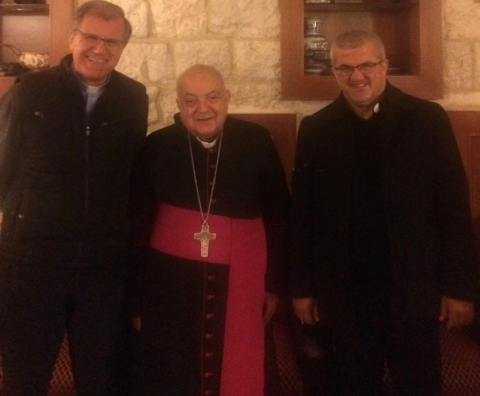 With Mgr Georges Bou-Jaoudé and Mgr Antoine Michael
With Mgr Georges Bou-Jaoudé and Mgr Antoine Michael
On hearing about the JC 2033 project, he said to me: "Let's unite! People are interested in celebrating together. Persecution pushes Christians towards greater unity. Pope Francis is also moving in this direction: the martyrs are a source of communion. The resurrection is the essence of our faith. Let's proclaim it together, with no half measures!
After the meal, I was able to talk to the ten or so seminarians. The next morning I was invited to give the homily at Mass. Mgr Antoine Michael, director of the seminary, suggested I go for a walk on the hills covered with oak and olive trees. The weather was still cool, with frost during the night, but it was a blessed time of fraternal communion in this beautiful creation.
"This jubilee will give us a glimmer of hope, strength and courage to continue on this path of martyrdom, of witness to Christ who is truly our life".
He talks to me in particular about the spirituality of the Syriac Antiochian Churches, of which the Maronite Church is a part. "It's a spirituality of the threshold, closer to Holy Saturday, a day of waiting, of transition between the death of Christ and the resurrection. It explains the precarious and persecuted situation of these churches. A spirituality of the dawn".
Commenting on the 2003 Jubilee, Mgr Antoine said: "This Jubilee will be a beacon of hope, strength and courage to continue on this path of martyrdom, of witness to Christ who is truly our life".
Acknowledgements
At the end of this brief but rich stay, my thanks go to Olivier Fleury, who initiated this marvellous vision of calling all the Churches to celebrate together the 2000th anniversary of the resurrection of our Lord. Also to Elodie and Rémy Pilloud: their presence has always reminded us that this project is primarily aimed at young people.
I would also like to thank Dany El Obeid, who was not just our guide and driver, but a key player in all our visits. He himself is already in close fellowship with several of the churches we visited.
Finally, I'd like to thank Carla Khijoyan, who made several contacts from Geneva. When I visited her in her office at the World Council of Churches, she said to me: "Talking about 2,000 years of Christ's resurrection is the message to be proclaimed in this region chosen by God. The message of hope that God is giving us in the terrible situation we are living in. We can start spreading this message today. But to do that, we have to go and listen to the Christians".
Thanks also to everyone who welcomed us! We have tried to listen. We also tried to sow seeds of hope. May God bear fruit and bless! Blessed be the name of Jesus Christ!
Martin Hoegger
 The beautiful Lebanon above Tripoli, between sea and white mountains
The beautiful Lebanon above Tripoli, between sea and white mountains

